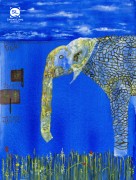“The Day of Small Things” is written from the perspective of a human who has a tremendous ability: To accept others as they are. The narrator says, “I think it’s necessary to love things the way you find them instead of how you wish they were.” Can you tell me more about this aspect of the narrator? How did it feel to write this character, and when did you start to understand this character’s extraordinary ability to see others?
I should mention that in my mind the narrator is a woman, so I’ll use female pronouns (although the story leaves this open to interpretation!).
There are two answers to this question: one mechanical and one philosophical. The character originated from one of those happenstances during the writing process. I felt that I needed a line of dialogue, for the narrator to actually say something out loud in the opening paragraph, and what I typed was, “You’re doing fine.” And my immediate reaction was Oh, god, that’s an awful line of dialogue! Then I wondered whether there was any circumstance where that line would be more than a pablum phrase a doctor uses to get people to shut up. And I realized that someone who took what they were saying really seriously, and meant it very honestly, would be interesting, and give the line meaning. The story (in its present form) grew from that idea, as well as from my staunch rejection of binary ideas about morality and value, especially around the content of character and the human body in general.
The narrator has grown up in conditions that were both incredibly beneficial and also at times harmful (something that most people could say about their childhoods). That experience doesn’t fit popular narratives of self-improvement or addiction. Yet for the narrator, her mother’s influence was complex and she treasures many aspects of it, and it shapes her view of the world. She very much treasures the unacknowledged, the unseen, and the so-called unloveable aspects of life. And she finds her own way of living out this philosophy, even centering her profession around it.
I’m terribly fond of this character, but I also ache for her. She’s somewhat isolated by her habits of being. Like many fiction writers, even if the details of the story aren’t true to my life, the sentiments of the story often are. In this case I think the story is both tender and somewhat sad.
The narrator is an oncological radiologist who connects deeply with a patient named Sue. They share fruit and a secret: There are many layers of emotion and experience that come with illness, and not all are “bad.” What is your personal connection to this secret, if you have one?
My mom did go through a course of radiology last year, so that was on my mind, but most of my personal experience is with mental illness. I’ve been afflicted (so to speak) with post-traumatic stress disorder, and at other times experienced depression, and grief. And what I’ve discovered is that for me, there are beneficial aspects to suffering. I sometimes have the feeling periods of suffering has allowed me to access special knowledge or secrets that otherwise would’ve remained hidden.
On the other hand, I don’t actively seek misery and wouldn’t encourage anyone else to. But when I find yourself in a situation of suffering, I’ve found that there’s often something to be learned, and surprisingly, there can be a pleasure to that education.
This story does a remarkable job of exploring the world without labeling experiences as “all good” or “all bad.” We see the narrator accept themselves as they chose a profession that they wanted, not one that their grandparents wanted. We see the narrator love their sister, their mother, and their grandparents, as they are—their anger, expectations, and addictions included. We see the narrator love Sue as she is—sick, recovering, honest, generous. We see the narrator understand death and life, expressing that even after death, love will exist. This love, to me, feels truly unconditional. It transcends something I cannot quite express in words, but maybe you can. Can you expand upon this type of love, the energy of it?
“Unconditional love” is exactly right. Mostly I think this type of love has to do with with clearly perceiving life as it is, and accepting that it has taken that form. (This is different, in my view, from passively allowing anything to happen!) It’s a kind of love that looks directly and kindly at what is. It allows one to have a sense of humor about oneself and others as well, which is terribly useful. Of course I totally fail to see the world through this lens all the time. Luckily, I’m not alone in that failing! And sometimes I feel like, how could you not love other people, when we’re all navigating this weird shit show of a world?
The narrator says, “I tell Sue what my mom told me: that there are a million ways to worship this world.” How do you worship this world?
I’m not an oncologist (or any kind of medical professional), but otherwise the philosophy the narrator lays out is one I cleave to pretty closely. I’m not particularly involved in any faith (both of my parents spurned the versions of Christianity they were raised with), so spirituality in my family has tended to arise from innate curiosity about the unknown elements of the universe around us rather than from any particular doctrine. I get a spiritual jones from thinking about particle physics, and also the span and scale of geological time, but also just from looking closely at all the things in the world that are nearby. I think I express a lot of my wonder through writing or drawing stories, too.
If you could tell the protagonist one thing, what would it be?
I would tell her to relinquish a little control, to open herself to being loved the way she’s determined to love others. In certain ways, her life is very closed off to other people—she has designed it just so, perhaps as a prophylactic against more chaos. But she could probably share a lot of it with other people if she allowed herself to be more vulnerable.


